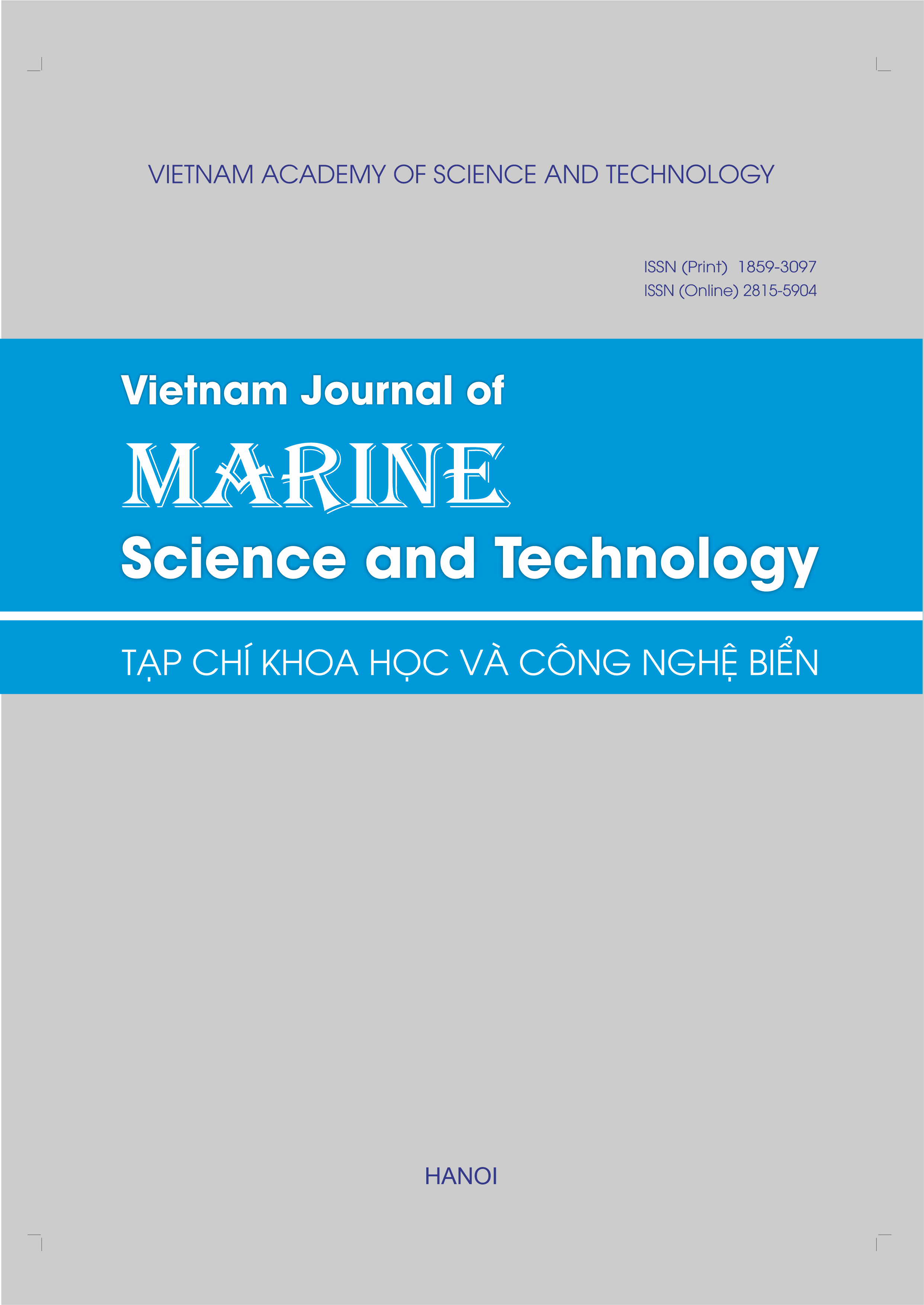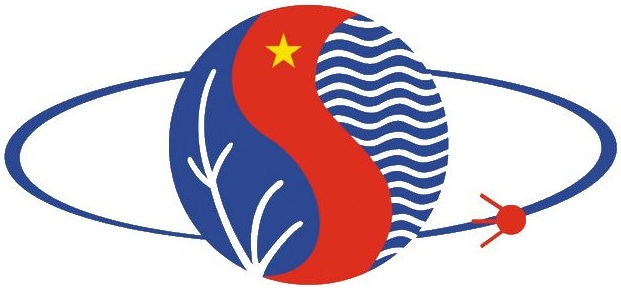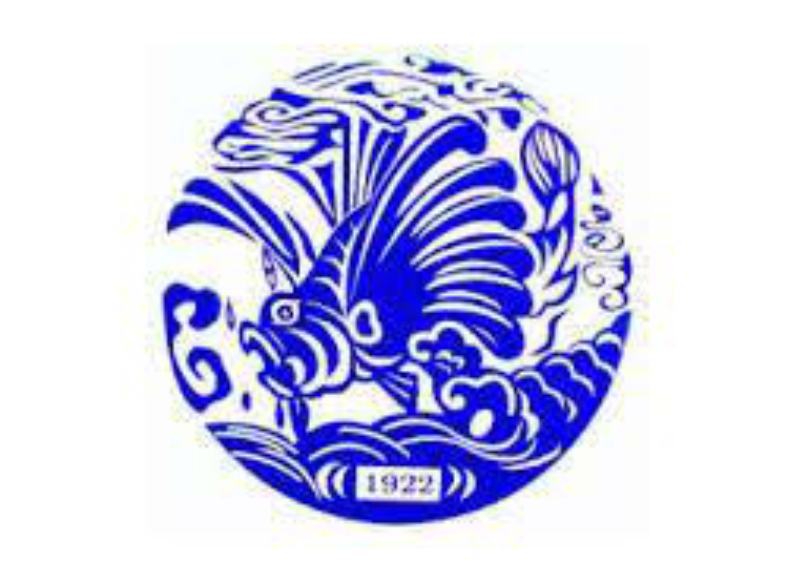Antimicrobial secondary metabolites from a marine-derived fungus Penicillium sp. OM07
Author affiliations
DOI:
https://doi.org/10.15625/1859-3097/19564Keywords:
Penicillium, diketopiperazine dimer, antimicrobial activity, ergosterol, marine sediment.Abstract
Eight compounds, diketopiperazine dimer WIN 64821 (1), ergosterol peroxide (2), ergosterol (3), 3β,5α,9α-trihydroxyergosta-7,22-dien-6-one (4), 3,4-dihydroxy-6,7-dimethyl-quinolin-2-carboxylic (5), norhaman (6), dihydrocitrinin (7), and phenol A acid (8) were isolated and characterized from the culture broth of the marine-derived Penicillium sp. OM07 strain was isolated from sediment collecting at Son Cha, Hue, Vietnam. Their structures were determined by analyses of MS and NMR data. All compounds were evaluated for their antimicrobial activity against a panel of clinically significant microorganisms. Most showed high antifungal activity against Candida albicans ATCC10231 strain with MIC values ranging from 8 µg/mL to 256 µg/mL. All compounds had inhibitory activity against from one to three Gram-positive tested strains with MIC values from 64–256 µg/mL.
Downloads
References
Kodoli, R. S., Galatage, S. T., Killedar, S. G., Pishwikar, S. A., Habbu, P. V., and Bhagwat, D. A., 2021. Hepatoprotective activity of Phyllanthus niruri Linn. endophytes. Future Journal of Pharmaceutical Sciences, 7(1), 97.
Yang, X., Liu, J., Mei, J., Jiang, R., Tu, S., Deng, H., Liu, J., Yang, S., and Li, J., 2021. Origins, structures, and bioactivities of secondary metabolites from marine-derived Penicillium fungi. Mini Reviews in Medicinal Chemistry, 21(15), 2000–2019.
Shaaban, R., Elnaggar, M. S., Khalil, N., and Singab, A. N. B., 2023. A comprehensive review on the medicinally valuable endosymbiotic fungi Penicillium chrysogenum. Archives of Microbiology, 205(6), 240.
Sikandar, A., Zhang, M., Wang, Y., Zhu, X., Liu, X., Fan, H., Xuan, Y., Chen, L., and Duan, Y., 2020. Mycochemical screening and analysis, antioxidant activity, and biochemical composition of fermentation strain Snef1216 (Penicillium chrysogenum). Journal of Analytical Methods in Chemistry, 2020.
Le, H. M. T., Do, Q. T., Doan, M. H. T., Vu, Q. T., Nguyen, M. A., Vu, T. H. T., Nguyen, H. D., Duong, N. T. T., Tran, M. H., Chau, V. M., and Pham, V. C., 2019. Chemical composition and biological activities of metabolites from the marine fungi Penicillium sp. isolated from sediments of Co To Island, Vietnam. Molecules, 24(21), 3830.
Anh, N. M., Huyen, V. T. T., Quyen, V. T., Dao, P. T., Quynh, D. T., Huong, D. T. M., Cuong, P. V., Dat, T. T. H., and Minh, L. T. H., 2024. Antimicrobial and cytotoxic secondary metabolites from a marine-derived fungus Penicillium citrinum VM6. Current Microbiology, 81(1), 32.
Andrews, J. M., 2001. Determination of minimum inhibitory concentrations. Journal of antimicrobial Chemotherapy, 48(suppl_1), 5-16.
Mamedova, R. P., Agzamova, M. A., and Isaev, M. I., 2001. Triterpene glycosides of Astragalus and their genins. LXIII. Chemical transformation of cycloartanes. iv. Partial synthesis of trojanoside A. Chemistry of natural compounds, 37(6), 529–532.
Barrow, C. J., Cai, P., Snyder, J. K., Sedlock, D. M., Sun, H. H., and Cooper, R., 1993. WIN 64821, a new competitive antagonist to substance P, isolated from an Aspergillus species: structure determination and solution conformation. The Journal of Organic Chemistry, 58(22), 6016-6021.
Wada, M., Suzuki, H., Kato, M., Oikawa, H., Tsubouchi, A., and Oguri, H., 2019. Stereodivergent synthesis of bispyrrolidinoindoline alkaloidal scaffolds and generation of a lead candidate with stereospecific antiproliferative activity. ChemBioChem, 20(10), 1273–1281.
Kaur, A., Raja, H. A., Darveaux, B. A., Chen, W. L., Swanson, S. M., Pearce, C. J., and Oberlies, N. H., 2015. New diketopiperazine dimer from a filamentous fungal isolate of Aspergillus sydowii. Magnetic resonance in chemistry: MRC, 53(8), 616.
Xu, J., Hu, Q., Ding, W., Wang, P., and Di, Y., 2018. New asymmetrical bispyrrolidinoindoline diketopiperazines from the marine fungus Aspergillus sp. DX4H. Natural product research, 32(7), 815–820.
Chang, Y. C., Hwang, T. L., Chao, C. H., and Sung, P. J., 2017. New marine sterols from a gorgonian Pinnigorgia sp. Molecules, 22(3), 393.
Seo, H. W., Hung, T. M., Na, M., Jung, H. J., Kim, J. C., Choi, J. S., Kim, J. H., Lee, H.-K., Lee, I. S., Bae, K. H., Hattori, M., and Min, B. S., 2009. Steroids and triterpenes from the fruit bodies of Ganoderma lucidum and their anti-complement activity. Archives of Pharmacal Research, 32, 1573–1579.
Kawagishi, H., Katsumi, R., Sazawa, T., Mizuno, T., Hagiwara, T., and Nakamura, T., 1988. Cytotoxic steroids from the mushroom Agaricus blazei. Phytochemistry, 27(9), 2777–2779.
Thi, Q. V., Tran, V. H., Mai, H. D. T., Le, C. V., Hong, M. L. T., Murphy, B. T., Chau, V. M., and Pham, V. C., 2016. Antimicrobial metabolites from a marine-derived actinomycete in Vietnam's East Sea. Natural Product Communications, 11(1), 1934578X1601100116.
Kamal, A., Tangella, Y., Manasa, K. L., Sathish, M., Srinivasulu, V., Chetna, J., and Alarifi, A., 2015. PhI (OAc) 2-mediated one-pot oxidative decarboxylation and aromatization of tetrahydro-β-carbolines: synthesis of norharmane, harmane, eudistomin U and eudistomin I. Organic & biomolecular chemistry, 13(32), 8652–8662.
Wang, Z. X., Xiang, J. C., Cheng, Y., Ma, J. T., Wu, Y. D., and Wu, A. X., 2018. Direct biomimetic synthesis of β-carboline alkaloids from two amino acids. The Journal of Organic Chemistry, 83(19), 12247–12254.
Haraguchi, H., Taniguchi, M., Tanaka, T., Oi, S., and Hashimoto, K., 1989. Citrinin, an electron acceptor having antifungal activity. Agricultural and biological chemistry, 53(6), 1741–1742.
Rödel, T., and Gerlach, H., 1995. Enantioselective synthesis of the polyketide antibiotic (3R, 4S)‐(−)‐citrinin. Liebigs Annalen, 1995(5), 885–888.
Downloads
Published
How to Cite
Issue
Section
License
Copyright (c) 2024 Vietnam Academy of Science and Technology

This work is licensed under a Creative Commons Attribution-NonCommercial-NoDerivatives 4.0 International License.








